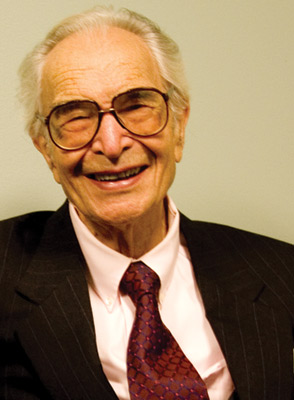
Dave Brubeck, the cool, cerebral, and popular piano player and composer who represented, for many, the face and the sound of American jazz music in the 1950s, died on Wednesday, December 5, in Norwalk, Connecticut, one day short of his 92nd birthday. Brubeck was a native of Central California, and, although he was a citizen of the world, he had strong ties to Santa Barbara. Brubeck played the Lobero Theater in Santa Barbara frequently for more than 50 years. He made his first appearance at the Lobero in 1953, and performed there as recently as September 2009.
After a 2006 Lobero show, Brubeck told Barney Brantingham of The Santa Barbara Independent a story about playing music in Santa Barbara even earlier than 1953. “I was in the Army in Death Valley,” Brubeck said, “and my brother [Henry Brubeck] asked me to sit in.” Henry Brubeck went on to become the head of the music program at Santa Barbara High School for many years. “Santa Barbara feels like home,” Brubeck said. “If I was smarter, I’d live here.” It was a sentiment he repeated more than once. Appropriately enough, a Lobero dressing room is named in Dave Brubeck’s honor, and the Santa Barbara Jazz Society funds a Henry Brubeck Memorial Scholarship.
Worldwide, Brubeck’s popularity was immense. His landmark 1959 album Time Out topped the charts, becoming the first jazz album to ever sell in excess of one million copies. The title track, with its cool syncopation and the distinctive saxophone work of Paul Desmond, is among the most recognizable compositions in American music. In 1954 Brubeck was on the cover of Time magazine, thus becoming the second jazz artist to make the cover, preceded only by Louis Armstrong. Like Armstrong, Brubeck was considered an International Goodwill Ambassador for Jazz. And, although Brubeck played his share of dark, smoky dives, he was uniquely well-known for performing at colleges and universities, and remained in demand at concert halls into his nineties. His fabled Dave Brubeck Quartet featured Eugene Wright on bass and Joe Morello on drums in addition to the incomparable Desmond. Together, they brought the sound of modern jazz to the masses, whether they were on or off campus.
Success was a double-edged sword for Brubeck. He was labeled a prophet of the new, cool, California sound, but he was for a time considered a sellout by bebop purist critics. Even as he was lauded for his elegant compositions and clever time signatures, Brubeck’s popularity made it difficult for him to be accepted as “important” in the manner of Charlie Parker or Miles Davis. In the end, what seems to have conquered this critical standoffishness was the way that Brubeck managed to keep an infectious grin on his face and a swing in his step, outliving his early critics in much the same way that his music will almost certainly outlive that of the majority of his contemporaries.
Brubeck fans can cite numerous individual highlights from throughout his career. His series of On Campus concert albums are still favorites, his 1964 live album is rightly considered a classic of the genre, and the swinging grooves on Time Out were “chill” and “lounge” long before those genres even existed.
In one rare moment, Brubeck’s smile faded, and audiences saw into the soul of the artist. Ken Burn’s 19-hour documentary Jazz was a ponderous affair, but it had moments of inspiration, none more so than the six minutes Burns devoted to Dave Brubeck. In that short time span — perfectly suited to an artist who, on vinyl, never wasted a moment — Brubeck related his upbringing in California and his early encounters with segregation and racism, both in the Army and in civilian life. Brubeck broke down recounting an early episode of his life when his father forced him to look at the scar from a branding worn by an elderly black migrant worker in Sacramento in order to educate the young Brubeck on the horrors and deep scars of slavery and racial injustice. Through tears, Brubeck told Burns that it was that injustice that he was fighting during World War II, and one senses that Brubeck never stopped fighting injustice — with his music, or any other way that he could. Brubeck made personal music that crossed all barriers, and that brought great joy to his audiences — regardless of race, color, or creed.
That is quite a legacy, for any artist.
Brubeck is survived by his wife, Lola; four sons, Darius, Dan, Chris, and Matthew (all musicians); daughter, Catherine; grandsons and a great-granddaughter.
